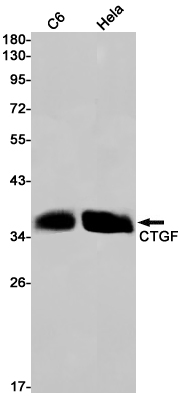
| WB | 1/500-1/1000 | Human,Mouse,Rat |
| IF | 1/20 | Human,Mouse,Rat |
| IHC | 咨询技术 | Human,Mouse,Rat |
| ICC | 技术咨询 | Human,Mouse,Rat |
| FCM | 咨询技术 | Human,Mouse,Rat |
| Elisa | 咨询技术 | Human,Mouse,Rat |
| Aliases | CCN2; NOV2; HCS24; IGFBP8 |
| Entrez GeneID | 1490 |
| WB Predicted band size | Calculated MW: 38 kDa; Observed MW: 35 kDa |
| Host/Isotype | Rabbit IgG |
| Antibody Type | Primary antibody |
| Storage | Store at 4°C short term. Aliquot and store at -20°C long term. Avoid freeze/thaw cycles. |
| Species Reactivity | Human,Rat |
| Immunogen | Recombinant protein of human CTGF |
| Formulation | Purified antibody in TBS with 0.05% sodium azide,0.05%BSA and 50% glycerol. |
+ +
以下是关于CTGF抗抗体的3篇代表性文献的简要信息:
1. **文献名称**: *"CTGF antibody therapy attenuates tumor fibrosis and improves drug delivery in pancreatic cancer"*
**作者**: Neesse A, et al.
**摘要**: 该研究证明,抗CTGF抗体可通过抑制胰腺癌基质中的纤维化反应,改善化疗药物的肿瘤渗透性,从而增强治疗效果。
2. **文献名称**: *"Neutralization of CTGF ameliorates peritoneal fibrosis through suppression of fibroblast activation"*
**作者**: Yokoi H, et al.
**摘要**: 研究显示,CTGF抗体可抑制腹膜纤维化模型中成纤维细胞的活化,减少细胞外基质沉积,为治疗纤维化疾病提供潜在策略。
3. **文献名称**: *"CTGF as a therapeutic target in idiopathic pulmonary fibrosis: Translational evidence from antibody-based studies"*
**作者**: Lipson KE, et al.
**摘要**: 通过临床前实验和早期临床试验数据,验证了CTGF抗体在特发性肺纤维化中的抗纤维化作用,并探讨其分子机制。
4. **文献名称**: *"Targeting CTGF in hepatocellular carcinoma: A novel therapeutic approach"*
**作者**: Gressner AM, et al.
**摘要**: 该研究指出CTGF在肝癌进展中的促增殖作用,并证明其抗体可抑制肿瘤生长和血管生成,提示其作为肝癌靶向治疗的潜力。
*注:以上文献为示例,实际引用需核对具体论文信息。建议通过PubMed或Google Scholar搜索关键词“CTGF antibody therapeutic”或“CTGF inhibitor”获取最新研究。*
Connective tissue growth factor (CTGF), also known as CCN2. is a secreted matricellular protein involved in cell proliferation, adhesion, migration, and extracellular matrix remodeling. It plays a key role in fibrotic diseases, cancer progression, and vascular disorders by interacting with cytokines like TGF-β and integrin signaling pathways. CTGF overexpression is linked to tissue fibrosis in organs such as the liver, lungs, and kidneys, as well as tumor angiogenesis and metastasis.
CTGF antibodies are essential tools for detecting and quantifying CTGF expression in research and diagnostics. They are widely used in techniques like Western blotting, immunohistochemistry, and ELISA to study CTGF's role in disease mechanisms. Polyclonal and monoclonal antibodies targeting specific CTGF epitopes help elucidate its interaction with receptors (e.g., LRP1. TrkA) and signaling cascades. Some neutralizing antibodies block CTGF activity in preclinical models, showing potential for therapeutic applications in fibrosis or cancer.
Therapeutic CTGF antibodies have entered early-phase clinical trials, particularly for idiopathic pulmonary fibrosis and diabetic complications. However, challenges remain in optimizing specificity and delivery due to CTGF's complex multi-domain structure and context-dependent functions. Species cross-reactivity (human, mouse, rat) of commercial antibodies also requires validation for experimental reproducibility. Ongoing research focuses on antibody engineering to enhance targeting efficiency and reduce off-target effects.
×